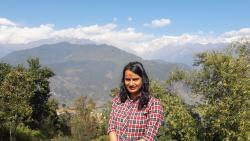
Tanahun, NepalAge: 29
Tell us a bit about yourself!
I grew up in a remote, hilly village in Nepal, playing with stones and mud and collecting firewood and leaf litter from the forest. I graduated with a Bachelor’s in Forestry from Nepal’s Institute of Forestry in 2012, during which I interned and volunteered for biodiversity conservation and climate change mitigation efforts in Nepal’s protected areas. Since 2015, I have been an Assistant Forest Officer in my District Forest Office under the Ministry of Forest and Soil Conservation.
My main tasks include mobilizing local communities and forest staff for the management of community and national forests, wildlife conservation, and restoration of degraded lands. In all of this work we emphasize both local people’s needs and environmental considerations. I also organize trainings for forest user groups to empower them with environmental awareness, as well as for front-line staff for general capacity development. I have also held many conservation education sessions for school students, covering various themes related to the environment and nature.
What inspired you to become a champion for the environment and environmental education?
I have been very much close to nature and the environment since my childhood days. My mother was an active member of the community forest user committee in my village, and I used to join her for tree plantings. I also participated in environmental programs at my school. These activities attracted me towards forest conservation, and led me to attend the Institute of Forestry for my Bachelor’s in Forestry. I was involved with many environmental activities with my professors and colleagues during my college life. During my field studies, I got a golden chance to interact with local people, community forest user groups, disadvantaged and vulnerable groups, and rural women who are dependent upon the forest and environment for their livelihoods. I knew that deforestation and climate change have made rural women’s lives more complicated and difficult. As a women from a rural community in Nepal, I became inspired to work in the environmental sector to enhance the lives of women and other vulnerable and disadvantaged groups in the community, by helping identifying problems, making decisions, and implementing solutions.
What advice would you give to the next generation of leaders that are looking to bring about positive change in their communities through EE?
Education and awareness play a major role in changing people’s perceptions of environmental problems. Although it is challenging to work with disadvantaged communities to improve their standard of living through environmental education, we can bring positive changes for both society and the environment. I believe that we cannot imagine any positive changes in the community without improving communities’ access to decision making and planning process. Although they face significant barriers to have influence in their communities, they play a significant role in bringing dynamic changes for the environment. I have faith that small actions can bring great, I urge the next generation of leaders take a bottom-up approach to achieve their goals. Think globally and act locally.
If you had to live in one place for the rest of your life, where would it be?
Bardia National Park, one of the largest national parks in Nepal’s Terai region. Residing in the buffer zone while I was an intern at the park, I successfully helped the local community develop a climate change vulnerability plan. While working with local communities, I came to know that there is increasing conflicts between human and wildlife. Many people have lost their lives, houses, and crops because of wildlife, and there is brutally killing of wildlife by local people in response. These conflicts are due to people and wildlife sharing resources, and particularly an increasing human population and lack of knowledge and awareness on conservation issues. These incidents always inspire me further to work with local communities to improve their livelihoods and encourage their involvement in wildlife conservation. So, I would like to continue promoting wildlife conservation in these communities, while living in this heavenly place and enjoying the wilderness of Bardia National Park.
What pro-environmental behavior do you think would make a big impact if everyone in the world started doing it?
Sorting house waste and improving waste management is one of the most impactful things you can do for our environment. The growing human population and global urbanization have caused significant pollution, however waste management can be challenging for local governments, civil society, and residents. If we work on managing our household waste – by simply sorting into degradable, recyclable, and non-recyclable – then waste management would not be big problem. We can then make compost from degradable waste for our home garden, or to donate to others who can use it. Paper, plastics, bottles, cans, furniture, electronics, and even clothes can be reused or recycled. These small changes in behavior can help us proper manage our waste. This not only saves the environment, but can even create job opportunities and revenue for communities.